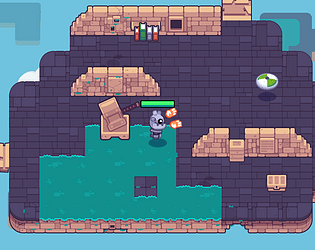I just saw the comments mentioning issues, I pushed a new build for web, macOS, and Windows. Please let me know if you keep having issues - you can reach me directly at support [at] gdquest.com if needed.
GDQuest
Creator of
Recent community posts
Go to options -> Language -> Italian and click Apply to display the Italian version.
For the latest release, we're lacking maybe 5% of Italian translations. The Italian version is community-translated. If anyone wants to help bring it back up to 100%, they can contribute translations here: https://github.com/GDQuest/learn-gdscript-translations/
I absolutely understand it's easy to forget some parts, and there could be more practices to go more gradually, as well as more user experience features if we had more funding. The app helped many people learn, and we're well aware that it can be improved and how. We've started work on a complete remake from scratch, though the lack of funding for this kind of free and open-source project makes it challenging to achieve.
To answer the specific case of the for loop you mention, I would invite you to re-read the lesson dedicated to for loops, where this is introduced ( https://gdquest.github.io/learn-gdscript/#course/lesson-18-for-loops/lesson.tres ).
When you write a for loop, you define a temporary variable to which the computer will assign individual values from the array. It's something we introduce in the lesson linked above. So when writing for size in rectangle_sizes, the size bit is a variable that we, the developers, create. You could name it however you'd like, for example, for current_rectangle_size in rectangle_sizes.
In each loop iteration, the loop variable will receive one value extracted from the rectangle_sizes array.
The jam starts in 15 hours! Are you excited?
We're already more than 200 developers registered for the event, pretty impressive! I can't wait to see all the games that result from it 😄
What's your goal for the jam? Do you plan on exploring specific features in Godot?
I'm going to try and find a concept that will make for a good open source demo for learning purposes, as usual. Even if it's not 100% on the theme.
Some quick advice to rock the jam
Sleep well: if you don't rest your code quality will get lower, you will generate bugs and waste time. I think it's best to work at most 10 or maybe 12 hours a day if you really want to push your project, but you have to make sure to get a good night of rest, to get away from the computer from time to time… It helps to keep your mind fresh and to stay productive.
Focus on one or two game mechanics: the best way to both manage the game scope and to make the game fun is to focus on one mechanic and to dig it as much as possible. I say one but it can be one, or two. It gives your project clear bounds so that you don't waste time going in many directions. Your programming work will have to focus on that mechanic, making it as fun and as pleasant as possible.
Start with a prototype: to know if the game will work or not you want to prototype the full game loop at the start of the project. Focus on the core mechanic, the core loop, and the controls. You don't want the game to look good at this point: you just need to set the pace, proportions, the flow of the game. And to have your full loop, with the fail and win conditions, if possible.
Do you have some more advice to share with everyone? Please add it below!
Thanks for the share @tinmanjuggernaut ! I went ahead and fixed the links in your post as itch grouped them in one URL.
I highly recommend starting with the docs (first link above), the official demos and the gdquest godot demos as they're designed for learning.
Both Chris (KidsCanCode) and I (GDquest) worked on the official docs, along with many other industry professionals. They're getting more and more polished over time. The getting started series alone should keep you busy until the jam starts :)



